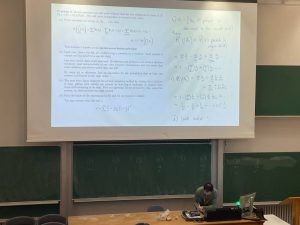
By Aadi Mankodi, 1st Year Mathematics MSci
Deciding whether a maths degree is right for you can be tricky. As a first-year student at King’s, I’ve learned what it truly entails. This post aims to guide you through this decision.
Curiosity – the drive to understand
When people think of a maths degree, many imagine a continuation of A-levels: more topics, more formulas, more theory. The truth is far from that. University maths is about understanding the why behind every result. Have you felt frustrated when given formulae without proof ? If so, a maths degree might be the right choice.
Let me take you back to my A-level days, when we were studying further maths. We came across the Poisson distribution. Euler’s constant (e) seemed to appear out of nowhere in the formula. How bizarre. Why e? Why not π? This inspired me to learn the full derivation. I asked my teacher, and when he showed me the proof, I was amazed at how simple it was. If you share this curiosity, you will truly enjoy a maths degree. It’ll force you to switch from a world of procedures to a world of proofs, logic, and concise definitions.
Consider something simple: proving that a function is increasing. Indeed, we could solve dy/dx ≥ 0. But what if you haven’t learned differentiation yet? How could you prove that a function is increasing from first principles?
A function f: ℝ → ℝ is increasing if for all x1, x2 ∈ ℝ, whenever x2 > x1, we have f(x2) > f(x1).
Simple, right?
Or consider sequences – what makes one diverge to infinity? We intuitively know that un = n (1, 2, 3, 4 …) diverges to infinity, but how do you prove it? We need a formal definition, of course. Here’s how it goes:
A sequence un diverges to infinity if, for every positive number H, there exists an N such that for all terms beyond N, un > H.
What a concise, simple, and elegant definition.
These are some of the topics you will learn at university. This is the kernel of maths at university: building absolutely everything logically from first principles. Recently, I felt inspired to embark on a little proof of my own: namely, proving that the area of a circle is the limit as n tends to infinity of the area of a regular n-sided polygon inscribed within that circle. Try it yourself!
You thrive on hard work, and the thrill of problem solving
Do you love the challenge of wrestling with a problem for hours, only to experience the satisfaction upon solving it? Then a maths degree will offer you an unparalleled experience. I remember preparing for the STEP exams in 2024. It was hard work, but preparing for them was surprisingly exhilarating. I could stay up late at night solving a problem – just for that sweet sense of reward. At King’s, the first-year course “CALCULUS I” features a lot of STEP-style problems that push your limits.
At Kings, the experience is far from just learning the theory; you’re given one problem set per module weekly. These are very well designed – starting with basic warm-up questions, and gradually increasing in difficulty (and fun). It’s not just about individual effort. You complete these in small groups guided by an PhD student. The experience of working as a team, brainstorming, and discussing different approaches is helpful. You ultimately sharpen each other’s skills.
As an A-level student, I always sought the laziest (and often unorthodox) route to solving a problem. I became known for it, in fact. For oblique impact (FM1), I’d use scalar projections or matrices, or for the area of a triangle, I’d use Heron’s formula. The point is there’s often many ways to solve a problem. This is true even at university. You’ll learn how to think outside the box.

Real-life application
One exciting aspect of a maths degree is discovering how maths shapes the world around us. From modelling the spread of disease to AI: advanced maths isn’t just desired; it is required in today’s world. Take cryptography, for example. Every time you use online banking, data is encrypted using prime numbers and modular arithmetic.
A unique environment at King’s
What I found sets King’s College London apart is not just its prestige, and world-class teaching, but also the collaborative environment. You’ll be surrounded by like-minded individuals who share your love for mathematics. The professors and PhD students are very accessible for 1-1 support, and they share your enthusiasm. The facilities are incredible, not just the Strand Campus, but also the beloved Maughan library.
But it’s not all about academics. Kings offers a vibrant student life, with over 300 societies. Plus, you’re in the heart of London.
Should you study mathematics?
A maths degree is undoubtedly challenging, and it’s not for everyone. But if you enjoy:
- Logical reasoning
- Proof
- Tackling challenging problems
- Meeting people on the same wavelength (no pun intended)
- Seeing how maths shapes the world
…then a maths degree is perfect for you.
However, if you prefer step-by-step procedures without really wanting to know why they work, university maths may feel overwhelming. And that’s perfectly okay!
Ready to take the plunge? King’s awaits you.

Leave a Reply